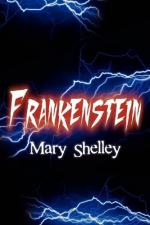|
This section contains 384 words (approx. 2 pages at 300 words per page) |
Frankenstein: Tone Via Literary Device
"Curiosity, earnest research to learn the hidden laws of nature, gladness akin to rapture, as they were unfolded to [him], are among the earliest sensations [he] can remember....It was the secrets of heaven and earth that [he] desired to learn; and whether it was the outward substance of things or the inner spirit of nature and the mysterious soul of man that occupied [him], still [his] inquiries were directed to the metaphysical, or in it highest sense, the physical secrets of the world."
In this passage alone three literary elements stand out. Shelly often uses comparisons to parallel the triviality of Victor's thoughts. The author also manipulates diction invoking powerful emotion. Mary Shelly not only creates and amazing literary work, but also parallels that work with literary elements that follow the novel's theme.
Statements that compare and contrast appear in this passage often. "Curiosity, earnest research ... [vs.] gladness akin to rapture..." ."..the outer substance of things [vs.] the inner spirit of nature..." Such contrast from a literary standpoint doesn't convey much to the reader, but because the book itself deals almost entirely with self discovery and the obvious difference between good and evil. Even the idea of contrasting the appearance and true nature of things appear numerous times.
Shelly's diction, though, resonates throughout her writing. Words and phrases like "curiosity, rapture, secrets of heaven, and substance" invoke such strong sensations in the reader. Practically feeling Frankenstein's emotions means everything to this novel. The tone of the entire novel reflects intense emotion. The reader can tell Frankenstein's every mood, not only by what he "says", but by the words Shelly uses.
Frankenstein, as a novel, exemplifies many literary devices that accent the tone of the story. Emotion and language consume the book. Shelly's amazing prose, diction, and syntax make Frankenstein amazing. Emotion, confusion and discovery consume this novel. Shelly makes that apparent though literary devises as well as the story those literary devices combine to create. Emotion can be written in a story as well as a single word. Shelly displays that with comparisons and clever word choice.
|
This section contains 384 words (approx. 2 pages at 300 words per page) |


